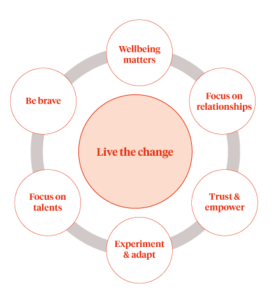Agile principles for tomorrow’s world
As 2020 comes to an end and a new year is about to start, the Capital People team has been reflecting on the past twelve months and the changes it has witnessed in the way organisations work.
One clear message from peers, clients, and colleagues is that things aren’t going to be what they were, or even what they are now. Each organisation is exploring what the future looks like for them. Key topics high on the agenda, across sectors, are a move to a more agile way of working, wellbeing, and the importance of adaptability and resilience at an individual, team and organisation level.
Research supports what we are hearing: that agile working is here to stay for many. What this looks like for each organisation will be different, but there will certainly be a mix of office and home working – the office space being described as a vital connection point, fostering a sense of community and collaboration.
There are many benefits to an agile way of working. As well as boosting employee morale and job satisfaction, it increases productivity and efficiency, offers greater geographical reach, improves talent attraction and retention and, of course, has a dramatically positive effect on our carbon footprint.
However, there are conflicting opinions regarding innovation and stress levels. While some believe innovation is enhanced with our new and creative ways of working, many feel that innovation is stifled as we lose impromptu conversation over the coffee machine or the opportunity to spark unplanned, creative thought processes that might only happen outside the constraints of a formal meeting. Stress levels are reported to be lower for many, as they have been freed from juggling the school run and the daily commute. Others have reported experiencing higher levels of stress, maybe due to feeling isolated and not having a suitable or safe environment to work in.
Another interesting consideration that we have been helping organisations with is recruitment during this time. Many people have spoken about their experience of joining a new role and organisation during the pandemic, and not yet enjoyed face to face contact with their team members. It has been interesting to explore ways in which these new colleagues can get a sense of the organisation, its values and culture if they are unable to submerge themselves within the environment in order to feel it. Translating the culture and values via a Zoom screen is a challenge, and while such platforms have been vitally important during this period, many are feeling fatigued by online video conferencing.
At Capital People, we agree that wellbeing should be high on the agenda and approach this with a view to create adaptable, resilient individuals, teams and organisations. For us, the starting point is mindfulness, which provides the opportunity to become present in the moment, not worry or think about the wave of uncertainty and challenge that has passed and not fret about the next wave that is about to wash over them. Just be present. Practising regular, effective mindfulness contributes to enhanced wellbeing, which in turn helps to develop resilience. Not resilience in the sense that people and teams keep battling through the storm relentlessly, but in the sense that they are able to take time, be mindfully present and recharge so that they can be better prepared and resilient to face the next wave.
So, for an agile workforce to work in an adaptive and resilient way, with their wellbeing at the heart of the organisation, it is important to consider the principles that sit behind this new way of working. We believe that ‘agile’ is more than the option to work from the office or from home. We suggest that organisations consider whether there needs to be a change in leadership style, a move away from traditional hierarchical structures. The ability to take action and learn quickly seems more important than future planning during this uncertain time. So is the need to become more transparent, to empower employees and to focus on talents and where best to apply them. We have found that a bespoke combination of coaching, psychometrics, training modules/programmes and exemplary HR support has had greatest impact when supporting organisations.
We believe that when organisations follow a few basic principles, it is possible to move from surviving these uncertain times to thriving and moving forwards.
Top tips to move from surviving to thriving

